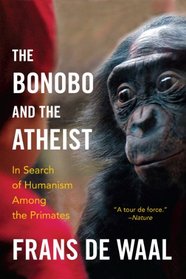De Waal's experiments and observations on fairness and morality in other species, particularly non-human primates, offers a fascinating insight into the likely origins of human morality. His "bottom-up" theory proposes that humans invented religions to strengthen ideals that are already in place, and that religion is important in encouraging humans to act morally. He criticizes "neo-atheists" like Richard Dawkins for being too eager to throw religion out the window. De Waal's views may be provocative to both atheists and the faithful, but his science is sound and his opinions are balanced and thoroughly researched. I gave the book four stars rather than five only because it seems slightly unorganized - the chapters jump around, and he repeats his main points unnecessarily frequently. If you read the book, you must also watch De Waal's TED talk. He shows videos of some of the fairness experiments with monkeys mentioned in the book. Seeing the videos and actually watching the monkeys' reactions to unequal rewards for performing equal tasks really drives De Waal's point home.
De Waal's experiments and observations on fairness and morality in other species, particularly non-human primates, offers a fascinating insight into the likely origins of human morality. His "bottom-up" theory proposes that humans invented religions to strengthen ideals that are already in place, and that religion is important in encouraging humans to act morally. He criticizes "neo-atheists" like Richard Dawkins for being too eager to throw religion out the window. De Waal's views may be provocative to both atheists and the faithful, but his science is sound and his opinions are balanced and thoroughly researched. I gave the book four stars rather than five only because it seems slightly unorganized - the chapters jump around, and he repeats his main points unnecessarily frequently. If you read the book, you must also watch De Waal's TED talk. He shows videos of some of the fairness experiments with monkeys mentioned in the book. Seeing the videos and actually watching the monkeys' reactions to unequal rewards for performing equal tasks really drives De Waal's point home.
Frans de Waal is probably the least defensive atheist in the world. A large part of the book supports a subordinate thesis that: it's not science versus religion that is behind the very visible attacks on science and religion - it's dogmatists.
Dogmatic people of all stripes cause needless trouble. I felt a great recognition of truth when I read that, and it gives me hope for the future. According to de Waal, some of the most militant atheists are former dogmatic religious nuts. Sometimes a can't-allow-disagreement-with-me person changes their team, but they don't lose the underlying personality trait.
But enough about that. Bonobos are fascinating, smart as heck, and offer great grist for thinking about human behavior. de Waal provides ample evidence that morality pre-dates the bonobo-human split - that bonobos have identifiable testable concepts of morality.
Moreover, that there are two basic forms of morality - that which he terms 'etiquette,' which can easily be forgiven in young individuals and is culture-driven (yes, in bonobos too), and that which seems to be encoded in our DNA - "Ape not kill ape" and the like.
Can't recommend this book highly enough. It really expanded my ways of thinking about the world.
Dogmatic people of all stripes cause needless trouble. I felt a great recognition of truth when I read that, and it gives me hope for the future. According to de Waal, some of the most militant atheists are former dogmatic religious nuts. Sometimes a can't-allow-disagreement-with-me person changes their team, but they don't lose the underlying personality trait.
But enough about that. Bonobos are fascinating, smart as heck, and offer great grist for thinking about human behavior. de Waal provides ample evidence that morality pre-dates the bonobo-human split - that bonobos have identifiable testable concepts of morality.
Moreover, that there are two basic forms of morality - that which he terms 'etiquette,' which can easily be forgiven in young individuals and is culture-driven (yes, in bonobos too), and that which seems to be encoded in our DNA - "Ape not kill ape" and the like.
Can't recommend this book highly enough. It really expanded my ways of thinking about the world.




